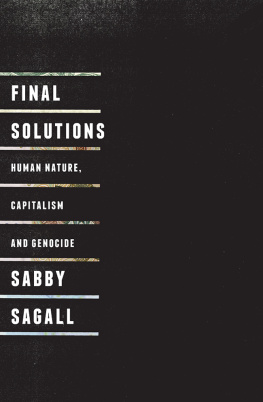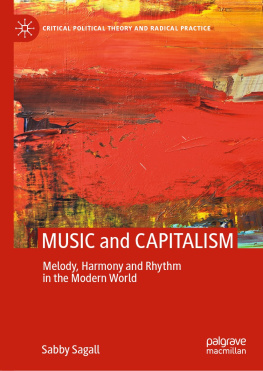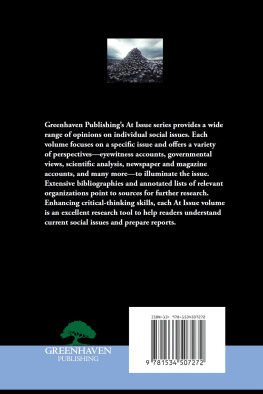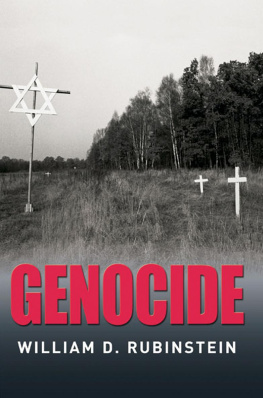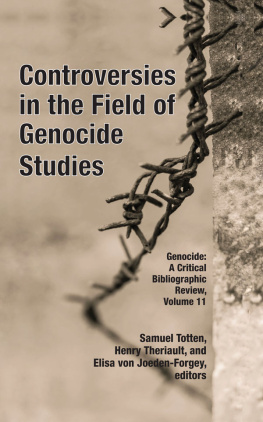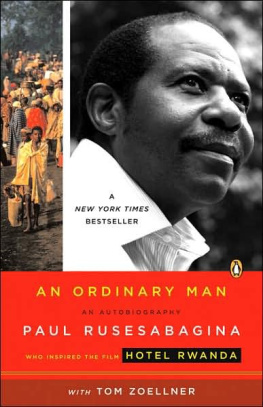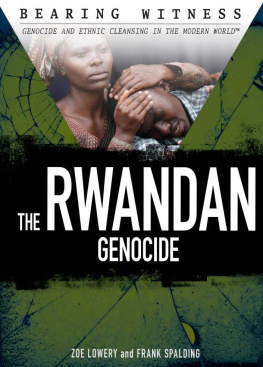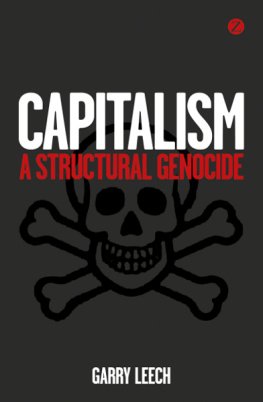Final Solutions
Final Solutions
Human Nature,
Capitalism and Genocide
Sabby Sagall
First published 2013 by Pluto Press
345 Archway Road, London N6 5AA
www.plutobooks.com
Distributed in the United States of America exclusively by
Palgrave Macmillan, a division of St. Martin's Press LLC,
175 Fifth Avenue, New York, NY 10010
Copyright Sabby Sagall 2013
The right of Sabby Sagall to be identified as the author of this work has been
asserted by him in accordance with the Copyright, Designs and Patents Act 1988.
British Library Cataloguing in Publication Data
A catalogue record for this book is available from the British Library
ISBN 978 0 7453 2654 2 Hardback
ISBN 978 0 7453 2653 5 Paperback
ISBN 978 1 8496 4891 2 PDF eBook
ISBN 978 1 8496 4893 6 Kindle eBook
ISBN 978 1 8496 4892 9 EPUB eBook
Library of Congress Cataloging in Publication Data applied for
This book is printed on paper suitable for recycling and made from fully managed and sustained forest sources. Logging, pulping and manufacturing processes are expected to conform to the environmental standards of the country of origin.
10 9 8 7 6 5 4 3 2 1
Typeset from disk by Stanford DTP Services, Northampton, England
Simultaneously printed digitally by CPI Antony Rowe, Chippenham, UK and
Edwards Bros in the United States of America
For Hilary
Contents
Acknowledgements
A number of colleagues, comrades and friends have read different parts of the manuscript and made valuable comments or else directed me to important sources and texts. I would like to thank Professor Alex Callinicos, Dr. Alison Sealey, Andrew Enever, Professor Bob Carter, Dave Renton, Hilary Westlake, Professor Iain Ferguson, Dr. Jacqueline Fear-Segal, Professor Joel Kovel, Professor John Docker, John Rees, John Rose, Ken Muller, Professor Kevin Kenny, Dr. Kurt Jacobsen, Lindsey German, Dr. Marci Green, Professor Mike Gonzalez, Assistant Professor Murat Paker, Dr. Rainer Funk, Professor Roy Foster, Professor Stephen Frosh and Dr. Tirril Harris. My partner Hilary Westlake and my friend Kurt Jacobsen read the entire manuscript: their ideas and suggestions, at times critical but always constructive, gave me great encouragement, and helped to sustain me during a long and difficult writing process. Naturally, any errors of fact or judgment remain my responsibility. Many thanks also to Kurt Jacobsen for compiling the index. Hilary developed a good impersonation of a badger in her constant exhortation to complete the work as quickly as possible. My friend John Rose's pressure was also helpful and important. My friends Dr. George Paizis, Gerry Norris and Mel Norris also expressed interest and provided encouragement.
I would also like to thank the staff at Pluto Press for their patience and encouragement. Roger Van Zwanenberg, my original editor at Pluto, supported my project from the earliest stage and has been particularly helpful throughout the years it has taken me to complete it. My editor, David Shulman, has also been most supportive during that time. Robert Webb, production editor, has ably helped me cope with editing difficulties and delays. I am also grateful to my friend Dr. Ghada Karmi for the original introduction to Roger Van Zwanenberg. Thanks also to Melanie Patrick for the cover design. Tim Clark, copy-editor, and Dave Stanford, typesetter, are to be commended for their skill and efficiency.
Introduction:
Capitalism and Genocide
Certain historical events seem to defy all attempts at rational explanation. How is it possible that one group of human beings should have consciously planned, or at least visibly intended, to exterminate another group? Despite innumerable books having been written on the subject, there is no general consensus. The experts continue to engage in fierce debate, or else to ignore each other's contributions if they fall in an alternative discipline.
Apart from humankind, no animal species destroys large numbers of their own kind without any rational socio-economic or biological benefit. Yet in the American continent, between 1492 and 1890, possibly 80 million Native Americans died at the hands of the European colonists or from diseases brought from Europe perhaps 95 per cent of the pre-Columbian population arguably the greatest genocide in world history. In Turkey, between 1915 and 1922, up to one and a half million Armenians were slaughtered on the orders of the Young Turk regime. During the Second World War, six million Jews, but also tens of thousands of Gypsies, homosexuals and the mentally ill were massacred in Nazi-occupied eastern Europe in a programme of industrial genocide. And during the Rwandan crisis in 1994, some 800,000 Tutsis were slaughtered by Hutus. In the twentieth century alone, over 70 million people have been killed through ethnic conflict, a figure dwarfing that of previous centuries.
The term genocide was coined by the jurist Raphael Lemkin in his book Axis Rule in Occupied Europe, published in the US in 1944. He defined it as the destruction of a nation or of an ethnic group. The new word, denoting an old practice in its modern development, is made up from the ancient Greek word genos (race, tribe) and the Latin cide (killing). Lemkin went on, however, to argue that it does not necessarily mean the immediate destruction of a nation, except when accompanied by mass killings of all members of a nation. The term signified a coordinated plan of different actions aiming at the destruction of essential foundations of the life of national groups, with the aim of annihilating the groups themselves.
In 1946, two years after the publication of Lemkin's book, and thanks to his unflagging lobbying efforts, the United Nations General Assembly passed a resolution which stated that many instances of such crimes ... have occurred, when racial, religious, political and other groups have been destroyed, entirely or in part ... The punishment of the crime of genocide is a matter of international concern. Finally, the Genocide Convention of the UN was adopted unanimously and without abstentions in 1948.
However, Martin Shaw argues in his very useful book What Is Genocide? that the Geneva Convention's definition of genocide unduly narrowed Lemkin's original broad meaning by restricting it to the physical extermination of a group. Killing is, of course, the ultimate means of genocide, the one which trumps all others, but it is not its primary meaning. For Lemkin, as indicated above, this lay in the annihilation of a group's way of life, its social networks, its economic, cultural and political institutions. There is a vast and growing literature on genocide, ethnic violence and ethno-nationalism. The lion's share of this endeavour has been given over to analyses of the Nazi Holocaust. In recent years, however, there has been increasing interest in the other modern genocides. A number of universities have set up special departments or programmes devoted to the study of genocide, Yale in the US and Southampton in the UK being two examples.
There are three points here. First, at an obvious level, this is undoubtedly to be welcomed. The deeper our understanding of human violence, the greater our chances of preventing it. A clich, no doubt, but one to cherish.
Second, the burgeoning interest in genocides other than the extermination of the Jews for example, that of the Armenians represents an implicit challenge to the notion of the uniqueness of the Nazi Holocaust. This has been the focus of an important debate in recent years.

